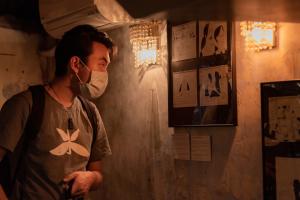EnviroInjustice Researchers

Enviornmental injustice researcher's program pages.
Environmental Injustice Reading

Collections of readings that examine and conceptualize environmental injustice.
Exhibition: Pollution, Data, Activism, 03.20.2021

This collection documents a talk and exhibiton about the Formosa Plastics Global Archive, held on March 20, 2021 at 柏林廢墟Tacheles in Taipei, Taiwan.
Photo Essay: Exhibition 03.20.2021
Photos from a talk and exhibiton about the Formosa Plastics Global Archive, held on March 20, 2021 at 柏林廢墟Tacheles in Taipei, Taiwan. All photos by Jiao Enguan 焦恩光.

pece_annotation_1477259985
tamar.rogoszinskiResearch using data from previous studies, interviews, and case studies helped the authors produce their claims. A strength to their methods is that they used anecdotes from not only doctors, but patients as well. Statistical data analysis also helped shape the argument about lack of mental health assistance and research. Their own professional capacity and knowledge also helped present their argument and formulate a cohesive, wholesome discussion.
pece_annotation_1477962723
tamar.rogoszinskiWhile this app is tailored for emergency situations, I would find it hard to believe that a physician who is in an emergency situation regarding radiological or nuclear danger would pull out their iPhone or Android to quickly find the proper dosage or way to triage patients. Although this app does suggest review before an emergency and print-outs from their website that can be kept with a physician in this type of situation, I do think it would be difficult for a physician to use their cell phone in this case. This app also works without data or wifi, which is good. But I feel that a physician might not want to take out their phones in an emergency situation, especially if it's because of nuclear spills or something to that nature that can ruin and contaminate their phones (and PPE).
pece_annotation_1472841720
tamar.rogoszinski"The Fukushima Effect: A New Geopolitan Terrain", edited by Richard A. Hindmarsh, Rebecca Priestley.
pece_annotation_1479071688
tamar.rogoszinskiThe author is Byron Good, Ph.D. He is an American anthropologist and teaches medical anthropology at Harvard Medical School. His main focus is mental illness and the cultural meanings of it. He also explores patient narratives and the perspectives of non-Western medical knowledge and compareds different mental health systems. He has done research in Iran, Indonesia, and the US. He has several publications including papers, books, and editted volumes.

Translation of the event description into Mandarin.